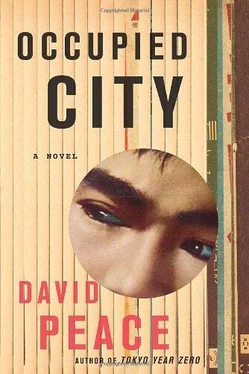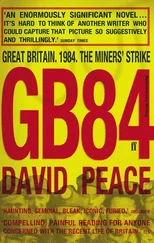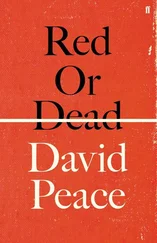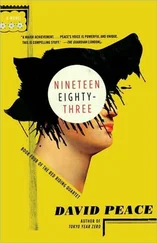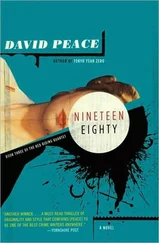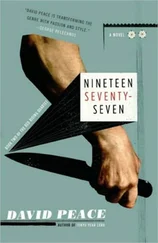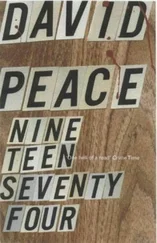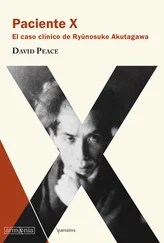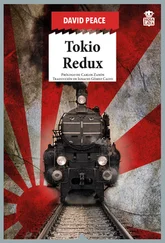‘My child!’
And the people whisper, ‘What once seemed a lost child now found is but wild grasses on a lonely tomb, their dull blades nodding in sign over the wastes of this river, the wastes of this city, in sorrow, nothing else remains. Only sorrow, nothing else remains — ’
‘In this city, the Occupied City,’ I hear you say. ‘Beside this river, the Sumida River, in this dawn, before this mound, I hear feet-step and tears-drop, so many feet, so many tears –
‘Shuffling, still shuffling.’
And now the people whisper, ‘This burial mound, though covered in wild grasses, is not made of earth. This burial mound is made of masks, a pile of clay masks. See now how the woman picks up the masks. See now how she tries on mask after mask — ’
‘I am a mother,’ I say, ‘and I am a sister. And I am a lover. And I am a wife. And I am a daughter …
‘I am a sister and I am searching for my brother. My brother who was taken from me in this city …
‘I am a lover and I am searching for my man. My man who was taken from me in this city …
‘I am a wife and I am searching for my husband. My husband who was taken from me in this city …
‘I am a daughter and I am searching for my father. My father who was taken from me in this city …
‘Through earthquake and through war, we have walked these streets, the banks of this river, and we have survived. Survived …
‘Now you say — he says, they say, all men say — the city has changed, the world has changed. But my city, my world has not changed. The shade of your skin, maybe, the style of your uniform, perhaps. But your collars are still dirty, your fingers still stained.
‘Post-war, après-guerre you say — he says, they say, all men say — but it’s always been post-war, already après-guerre.
‘Conquered from birth, colonized for life, I have always, already been defeated. Always, already been occupied –
‘Occupied by you –
‘Born of me, the death of me. Blood of you, the death of me. Come in me, the death of me. Rob my name, the death of me. Born of you, the death of me –
‘In the snow. In the mud. Beneath the branches. Before the shrine. In the genkan . In the bank. On a street in China. In a wardrobe in Tokyo. With your poison. With your pen.
‘It is you. And only you.’
The Black Gateis gone, its upper chamber is gone, the occult circle and all of its candles now, now you are in darkness –
The candles out and the medium gone,
the story-telling game is over.
Come and they came, stand and they stood, sit and they sat, strip and they stripped, take this medicine and they did,
though it’s poison, still they did,
die and they died, for you,
and only you, in agony,
in fear, in silence –
In white paper, their bodies prone, their faces contorted. In black ink, their heads shaved, their mouths stitched, they are yours,
and only yours, in their costumes and in their masks, all your actors and all your characters, for you are the writer,
you are their wound, you are their plague,
wrapped in paper, wrapped in ink, they are raised, frozen and petrified by the sorrow you brought them,
the suffering you left them –
IN THE OCCUPIED CITY, this city is a coffin. This city is a notebook. This city is a purgatory. This city is a plague. This city is a curse. This city is a story. This city is a market. This city is a wilderness. This city is a wound. This city is a prison. This city is a mirror. This city is a river. And this city is a woman –
‘In sorrow,’ she whispers. ‘Nothing else remains. Only sorrow. Nothing else remains. Only sorrow …’
In tears and in truth, pouring down upon you now, this heavy rain, this water-fall, flooding down upon you now,
drowning you in water and in salt,
in her tears and in her truth,
her tears, her truth –
‘Remains …’
And she has tied you to a chair, tied you to a desk, a pen nailed to your palms, bound to your fingers,
life leaking, death dripping,
but not in ink, in tears,
in tears and in truth,
at last, at last,
no more costumes and no more masks, no more actors and no more characters, no more stories and no more lies,
the book always, already written,
written and abandoned,
in-caesura .
Hirasawa Sadamichi was convicted of the Teikoku Bank murders,
attempted murders and robbery on 24 July 1950,
and sentenced to death.
Despite the dedication and efforts of the Society to Save Hirasawa,
Hirasawa died in Hachiōji Prison on 10 May 1987.
Hirasawa was ninety-five years old.
The appeals and the campaign to clear Hirasawa’s name,
posthumously, continue to this day.
At the time of writing, the nineteenth request for a retrial,
which was filed on 10 May 1989,
is still being examined by the Tokyo High Court.
David Peace, Tokyo, 2008
The Year of the Rat
The structure of this book was suggested by Rashōmon and In a Grove , two short stories by Akutagawa Ryūnosuke (1892–1927), both of which have been translated into English many times, most recently by Jay Rubin in Rashōmon and Seventeen Other Stories (Penguin Classics, 2006). Kurosawa Akira’s 1950 film Rashōmon was also influential, as was the Rutgers University Press book Rashōmon (1987), edited by Donald Richie.
The murders at the Teikoku Bank in Tokyo in January 1948 have been written about in English in Flowering of the Bamboo by William Triplett (Woodbine House, 1985) and in Shocking Crimes of Postwar Japan by Mark Schreiber (Yenbooks, 1996). In fiction, the case was also the subject of Averse d’automne by Romain Slocombe (Gallimard, 2003).
The following were also used:
731 by Aoki Fukiko (Shinchosha, 2005)
731-Butai Saikin-sen Shiryō Shusei CD-ROM edited by Kondō Shōji (Kashiwa Shobō, 2003)
Akuma no Hōshoku by Morimura Seiichi (Kadokawa Shoten, 1983)
Asahi Shimbun newspaper for 1947-8
Civilization & Monsters by Gerald Figal (Duke University Press, 1999)
Curlew River by Benjamin Britten, to a libretto by William Plomer; particularly Olivier Py’s production at the Royal Lyceum Theatre, Edinburgh, in August 2005
The Diary of a Madman by Nikolai Gogol (1835)
Discourses of the Vanishing by Marilyn Ivy (University of Chicago Press, 1995)
Factories of Death by Sheldon H. Harris (Routledge, 1994)
Japanese Ghosts and Demons: Art of the Supernatural edited by Stephen Addiss (George Braziller, 1985)
Keiji Ichidai: Hiratsuka Hachibei no Shōwa Jiken-shi by Sasaki Yoshinobu (Sankei Shimbunsha; Nisshin-Hōdō Shuppanbu, 1980)
Materials on the Trial of Former Servicemen of the Japanese Army (Foreign Languages Publishing House (Moscow), 1950)
Nippon no Kuroi Kiri by Matsumoto Seicho (Bungei Shunju Shinsha, 1960)
Nippon no Seishin Kantei edited by Fukushima Akira, Nakata Osamu, Ogi Sadataka, Uchimura Yushi and Yoshimasu Shufu (Misuzu Shobo, 1973)
Nippon Times and Mainichi newspapers for 1948
A Plague Upon Humanity by Daniel Barenblatt (HarperCollins, 2005)
Shōsetsu Teigin Jiken by Matsumoto Seicho (Bungei Shunju Shinsha, 1959)
Sumida-gawa by Motomasa Jūrō (c. 1400-32), translated by Royall Tyler in Japanese NO Dramas (Penguin Classics, 1992)
Teigin Jiken by Morikawa Tetsurō (Sanichi Shobō, 1980)
Читать дальше
